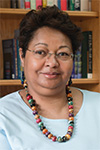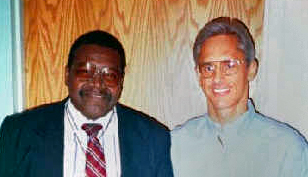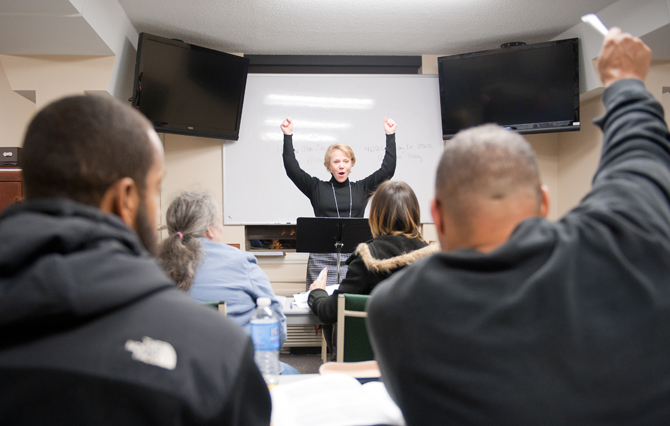The Rev. Donald L. McCoy, pastor of the Pleasant Hill United Church of Christ in Fuquay-Varina, N.C., prays as he ponders decisions.
In the early 1990s, McCoy was seeking estimates to pave his church’s parking lot. Chris Mangum, vice president of C.C. Mangum Co. Inc., answered the call.
“He asked me if I minded if he came out to measure the lot,” McCoy said. Afterward, McCoy invited Mangum inside the church to petition God’s counsel over the deal.
“He was a Christian,” McCoy said. “He had no objections. We joined hands, stood around the altar and prayed.”
After he left, Mangum spent several weeks working with other companies to donate labor and material; the $11,000 paving job cost the church just $100.
This meeting was the beginning of a friendship between McCoy, a black preacher and chemist, and Mangum, a white business owner. And that friendship was the foundation of Jobs for Life, which today is an international organization with a mission to provide meaningful work to men and women.
“Chris and Donald kneeled together and prayed,” said the Rev. Skip Long, the first executive director of the jobs organization, who became part of the circle. “God was knitting their hearts together for greater work.”
They were an unlikely pair.
McCoy had been involved in the 1960s civil rights movement during his student days at Livingstone College in Salisbury, N.C. He had been the first black manager at a textile mill -- an affirmative action hire -- supervising whites and blacks.
He didn’t mind rolling up his sleeves to work with a man who shared his faith. “I’m a God-fearing individual, so it didn’t really bother me.”
Chris Mangum, who died May 2, 2013, was vice president of his family business, one of the state’s largest highway contractors and asphalt producers. When McCoy called about the paving job, Mangum and his family were beginning to realize they needed to change the culture of their business.
Chris and his brother Merl had grown up Presbyterian, but the turning point in their religious life had occurred when their faither made them go to a movie produced by the Rev. Billy Graham’s organization.
It was 1968, at Memorial Auditorium in Raleigh. Audience members were invited to come to the front to give their hearts to Jesus Christ. “My brother walked down the aisle, and I followed,” Merl Mangum said.
Many years later, Chris Mangum sought out Christian help to change his company culture. He sent Merl and the trucking superintendent to attend a racial reconciliation seminar in Raleigh with the Rev. John Perkins, an African-American preacher who had suffered a great injustice.
Perkins, the son of a Mississippi sharecropper, had fled to California when his older brother was murdered by a town marshal. He eventually returned to the South spreading the gospel of Christ.
“We were blown away,” Merl Mangum said. His co-worker bought a cassette tape at the event and shared it with Chris. “You need to listen to this,” he said.
“That message got into his heart,” Merl Mangum said about his brother. “He didn’t have a single black friend in his life. He realized that was not right. Shortly after that, he got the call from McCoy and decided to go out personally to see what McCoy needed at his church.”
During one of the early conversations between Chris Mangum and McCoy, Mangum revealed that he had trucks parked because he couldn’t find good drivers. McCoy, a full-time environmental chemist as well as a pastor, knew African-American men in his community who needed jobs.
This shared dilemma quickly blossomed into Jobs Partnership of Raleigh (now Jobs for Life), based in their respective communities and grounded in their mutual faith.
“Those events were orchestrated by God,” Merl Mangum said.
The leadership of the organization soon expanded to include another friend -- Long, a popular faith leader in Raleigh. Chris Mangum and McCoy recruited Long to manage the day-to-day operations of the nonprofit.

Long, a pastor affiliated with the Mennonite Church, also helped Mangum deal with diversity issues at the paving company.
The majority of the company’s employees were black, but all the leadership was white. Long helped Mangum understand the racial tension this created. He asked Mangum, “Why has not one person of color risen into leadership?”
The company formed a healing commission, which led to African Americans being promoted into higher-ranking positions. As Chris Mangum and Skip Long traveled the country figuring out how to operate the jobs program, they too became friends.
Long, who is built like a football player, and Mangum, a silver-haired businessman, would often be mistaken for a professional athlete and his sports agent. These moments opened up questions about race and humanity that the two men explored together.
Long was often the teacher: “Chris wanted to learn and understand.” Once, for example, Chris Mangum asked him why he conspicuously showed his money as he entered a store. Long explained that as an African-American man, he wanted to signal to the storekeeper that he could pay for what he wanted.
Friendship, business and mission blended together over the years. Their families vacationed together. They had a Halloween tradition of going out to dinner and a movie.
“We talked about race and power. We entered into one another’s lives,” Long said. “We were just a group of friends, sharing our resources and intellectual capital.”
The friendship was beneficial to all.
“Our men didn’t have jobs. They were in the streets. I wanted to make sure that our people got jobs,” McCoy said. “Chris wanted to have a black friend; he wanted to know someone out of his circle. We had an exchange. He and his family would come and worship at our church, and I would worship at his church. It was unusual for a white businessman to partner with a black pastor, especially in the South. He was humble and willing to listen.”
Mangum, an avid cyclist, was killed last year in an accident while riding his bike in Raleigh’s North Hills neighborhood. At his funeral, Mangum was remembered as a “community servant.”
Long, now the director of community engagement for the YMCA in Richmond, Va., said his son delivered the news of Mangum’s death.
“It was like somebody had punched me. It paralyzed me for a moment,” he said. “But then I was reminded of the great life he led. So much is captured in that dash between when he was born and when he died. He was willing to trust God. He had a great marriage, worked hard at his company, raised his children and loved his community.”















